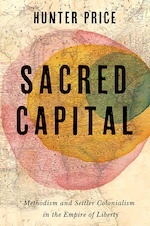Today, we are happy to bring you our conversation with Hunter Price, author of Sacred Capital: Methodism and Settler Colonialism in the Empire of Liberty
What inspired you to write this book?
Early in graduate school, I came across the three volumes of journals and letters of Methodism’s most important American leader, Francis Asbury. It was such a rich and expansive source, a traveler’s account of minute observations of settler life across a staggering breadth of the emerging United States. I had already decided I wanted to study early American religion, but now I started to realize how important the Methodists were to the nation’s story. My graduate advisor inspired me to think about that importance at the simplest level, of physicality, and see where it took me. Ultimately, I took research trips to almost as many states as Asbury had visited on horseback, but I had the advantage of a 1995 Honda Civic.
What did you learn and what are you hoping readers will learn from your book?
I learned so much. Early American Methodism holds many valuable lessons for modern readers. One theme that occupied me throughout the project is an old one in American religious history: the tension between worldliness and the desire to transcend the world. Methodists were obsessed by both, and it led many of them to not recognize discrepancies between their stated beliefs and their actions. My job was to explain Methodism according to the particulars of time and place, but this tension is common to much of human history; it remains with us today. The Methodists I focused on were complex beings driven by conflicting desires; that’s what made them like the rest of us.
What surprised you the most in the process of writing your book?
This book started as an exploration of the relationship between religion, science, and medicine. That led me to Ohio Methodist James B. Finley. I was surprised by how well connected across regions and subjects this one man was. It soon dawned on me that I was discovering a religious social structure created by people hostile to their world but who regularly used their evangelical organization to pursue worldly ends. The most important story was not about religion and science or the extraordinary spectacles (shouting, barking, and shaking to name a few) occurring at frontier camp-meetings but was instead the innumerable, everyday ways Methodists used their connections for the basic work of settlement in the years after the American Revolution.
What’s your favorite anecdote from your book?
The fun of the research was finding those “perfect” anecdotes. Here’s one that captures how easily Methodists (like many other settlers on the make) used their religious networks for their basic worldly desires. Two brothers, both Methodists, corresponded about crops and women. The Indiana brother realized his circuit-riding brother in New Orleans had the skinny on both topics; both topics interested him for advancing his financial situation. In his letter, the brother discounted one Louisiana woman’s appearance against her being worth between $5,000 and $10,000, declaring he would "not hesitate confirming a marriage contract with her, without the least assistance of Cupid.” The very next sentence relayed an idea for arbitraging corn between the Lower South and Midwest. With sacred capital he reduced women and plants to commodities in one easy paragraph.
What’s next?
I’ve jumped into exciting new research for another book. I’m studying a family of lowcountry Georgia slaveowners and Confederates that produced two prominent American scientists, John and Joseph LeConte, who helped start the University of California and the Sierra Club. And I’m trying to recover the history of the enslaved people who built the plantation and funded the family’s prominence with their labor. The book will be a mixture of science, religion, race, natural history, botany, gardening, and environmentalism, tied all together as an examination of memory and forgetting from the rice swamps of lowcountry Georgia to the waters and mountains of northern California.





